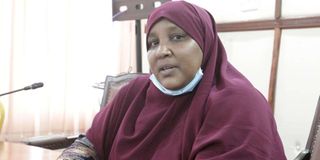Mandera female MCAs stamping their authority

Ms Hindia Hussein Ibrahim, chairperson Mandera Female MCAs Caucus during the interview on September 15, 2020. She said despite challenges women seeking political offices in the county face, they are braving the storm.
What you need to know:
- Ms Hindia Hussein Ibrahim, nominated MCA and chairperson Female MCA Caucus says they are on course in turning the political tide.
- All the 16 female members at Mandera County Assembly are nominated.
- The women have managed at least three bills including the Breastfeeding Bill, Gender-Based Violence Bill and Mandera Water Bill.
- Female political aspirants not willing to participate in electioneering process for fear of victimisation and intimidation from their male counterparts and the council of elders.
Female politicians in Mandera are braving the storm to achieve what culture, religion and male chauvinism have barred them from realising over the years.
Ms Hindia Hussein Ibrahim, nominated MCA and chairperson Female MCA Caucus at Mandera County Assembly says they are on course in turning the political tide.
“We face many challenges when seeking elective posts, including cultural hindrances and always being under the rule of men who decide almost everything,” she says.
All the 16 female members at Mandera County Assembly are nominated, a situation Ms Ibrahim says limits their working ability. She, however, remains optimistic the culture will soon change.
“We have managed at least three bills in the assembly; one was passed and is at the implementation stage,” she notes.
Breastfeeding Bill
Last year, Ms Sokorey Maalim sponsored the Breastfeeding Bill that sought to compel employers to provide special rooms for mothers to bring their babies to their work places. The bill was also pushing for the county to have such facilities in public places and markets, but the same is yet to be realised.
“We are very active on the floor,” she says.
Ms Nasra Noor Mohamed is also drafting the Gender-Based Violence Bill that will define punishment of those engaging in defilement, and seeks to bar elders from solving the same through the Maslah.
Ms Hindia is drafting the Mandera Water Bill, which will ensure every individual has access to the essential commodity across the county.
“We want to deal with the water cartels in Mandera through this bill and streamline the process of water management,” she says.
The caucus’ biggest achievement is girl child education. Ms Hindia says, through personal contributions, they are educating 18 girls and three boys in the county.
Political leaders
On the assembly floor, Ms Hindia says the 16 members have managed to counter their 32 male counterparts and are more present on any issue touching on local livelihoods.
The caucus is on a mission to change the mind-set of locals when choosing their political leaders.
“We are qualified to hold political offices. We keep telling our people that if a woman is elected, she can perform just as well as our male counterparts; the biggest hindrance remains the clan issue,” she asserts.
She notes that most qualified women are rejected because they come from minor clans or sub-clans. ‘Clanism’, according to her, denies the county good leaders because they elect leaders based on the clans they come from and not their capabilities.
Marital status
The situation gets worse for married women.
“A woman might be from a certain clan and married in a different clan; she will not be elected or considered for such a position because those she is married to believe she will take their resources to where she was born,” she says.
She says residents, guided by elders, deny locals better leaders through such beliefs and culture.
“Change is coming and at the moment, women are taking administrative positions like becoming chiefs,” she said.
The county has two female chiefs and an assistant chief. At the assembly, at least two committees are chaired by women and some are in the speaker’s panel.
Ms Hindia says the secret to women’s success is proving their ability to lead and serve the residents well. Lack of finances to run their activities is also a hindrance she decries.
Council of elders
“Elected MCAs represent wards and have the ward funds, but we are about the county and we need funds to enable us work for everyone,” she says.
Chairperson Mandera County Public Service Board Ms Ethila Mohamud, acknowledges that female MCAs in Mandera face numerous challenges.
In her project report submitted in partial fulfilment of the requirement for the award of Master’s degree at University of Nairobi in 2018, she says the MCAs were all selected by the council of elders and not elected, making it difficult for them to exercise their leadership abilities on political fronts.
She opines that any political move is seen as disrespect to the elders, meaning the female political leaders are “remote controlled”.
Victimisation
She observes that female aspirants are not willing to participate in the electioneering process for fear of victimisation and intimidation from their male counterparts and the council of elders.
“Most political parties in Mandera are unwilling to hand women direct nomination to vie in the elections against men and the parties remain discriminative against women,” she said.
The council of elders also decide who the woman representative candidate should be and their choice has always ended up the victor. They also decide on who manages what project, organisation and any activity, including those fronted by the national government.





